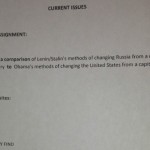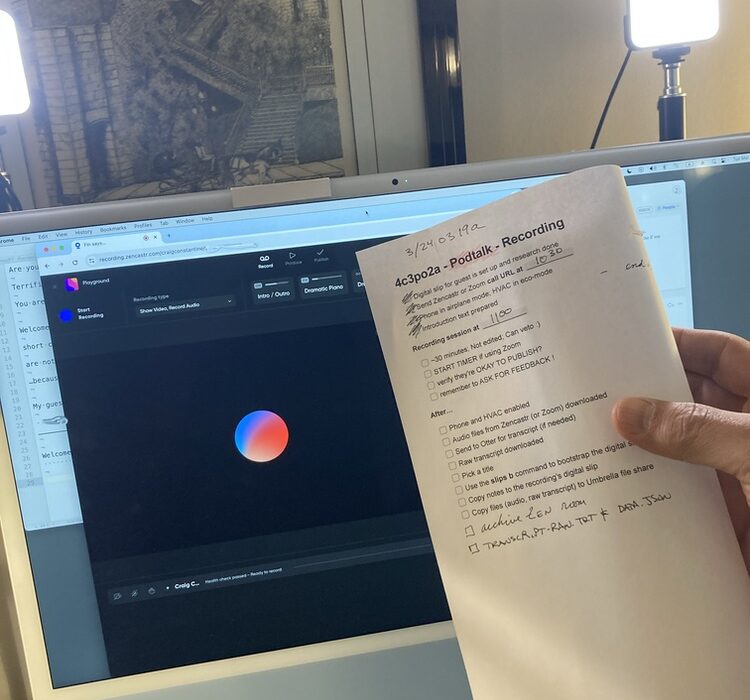Upon reading my title, were you…
a) incredulous; you disagree with the premise.
b) happy; you agree with the premise.
c) curious; you already understand what this blog post is about.
d) other; because this author isn’t omniscient, (and you can stop reading now.)
This post is about logic, discourse and discussion; Not in a dry, academic sense, but in the sense that, “lack of logic, discourse and discussion is the root problem in America today.” It’s just a bonus that I have a wickedly inflammatory example to use as a framework for this post to keep things interesting and lively.
Background
The catalyst for this post was a news item which I stumbled upon via Facebook:
‘Obama socialism’ homework angers students at Cobb County high school
 Knowing that the news outlet will eventually move/remove that story, at right is an image of the homework assignment in question. The original news story indicated this was from a social studies class at the high school level.
Knowing that the news outlet will eventually move/remove that story, at right is an image of the homework assignment in question. The original news story indicated this was from a social studies class at the high school level.
After seeing the news item posted on Facebook by a friend, I shared the link to the CBS Atlanta affiliate’s story. Two of my friends — and I mean “friends” in the real world sense of people with whom I would break bread, or to whom I would give money — joined me in the comment thread. (Names withheld here of course.) My first “wait what?” comment is the one I included with my sharing of the news item; These comments are unedited, just as they appeared on Facebook.
Craig: wait what?
I don’t see any problem. Did the verb ‘compare’ get a new definition? The first definition from dictionary.com is…
“to examine (two or more objects, ideas, people, etc.) in order to note similarities and differences: to compare two pieces of cloth; to compare the governments of two nations.” (It’s even apropos!)
So, upon comparing the two items in question, students might draw various conclusions; The items are similar, or different, to varying degrees.
mmmmmmmmm, semantics and pragmatism for the win.
Person A: I don’t know exactly what the teacher said when setting the tone for this assignment but in the article “find evidence for a comparison” is a leading statement. Otherwise as you suggested, you just compare. “Compare (and contrast) the change in Russia during the time of Stalin and Lenin, with the change in the United States during the time of Obama.” The notion that the time period in question for the United States is marked by a shift from capitalism to socialism is plain heresay. I don’t know enough about the evolution of Russia to suggest whether that shift is also heresay. The leading and heresay reaks of a “teacher” agenda.
Craig: how does “find evidence” change the meaning of the word “compare”? …it certainly means one may not simply state opinion when comparing. But does “find evidence” bias “compare”? If the question had said “contrast” the teo, that’d be leading since contrast means highlight the diffs. But “compare” is very clearly NOT an antonym of contrast. “compare” is neutral.
Person A: I don’t disagree with your posted definition of compare. That is clear. “Find evidence for comparison” clearly suggest (to me) that the author does believe that compare is an antonym of contrast. You simply compare. if you “find evidence to compare” this suggest to me that you are looking for parallels, how are the two things similar or the same, in other words find evidence that these two things are similiar. If you simply compare two things it will be evident if they are similar or dissimilar. semantics perhaps.
Person B: What I believed to be in poor taste, and the reason I posted the article, is that there is a pretty clear motive in comparing someone like Stalin, a clearly awful figure in human history, with the current president. It is, to me, a pretty obvious dig on someone that the teacher in question just doesn’t like. If this were a purely intellectual exercise, sure. Why not. But invoking the name of ‘Stalin’ never brings up a discussion of what socialism is and what it does and doesn’t do *first*, it brings up themes of genocide and corrupt government.
Craig: I find this discussion to be very interesting. There’s something at the center here; Something which I can’t quite identify… perhaps it’s the projection of, what one assumes one knows about the teacher, onto the instructions. Why do that? I mean, wouldn’t it make more sense (as a student following the assignment, or a person generally in life) to just follow the instructions guided by your own person context?
So you see these instructions. You think about the teacher’s sub-text — whatever you think about the teacher, they’re wrong in their bias, they’re right, they’re intending satire, whatever. Then you proceed on the assignment. Why must one (who is given the assignment) “react”, when one could “converse/discuss/discover” based on the direction given.
If this story had been about a kid failing (or getting a zero etc) for showing evidence why the President is different, THEN I’d have an issue.
Person C: I’m on board with Craig on this. The language of the assignment was pointed, but whether it is inflammatory is based on the views of the reader. In the end, the assignment may have left an impression of what the teacher’s viewpoint may be, but it does not direct the student to provide a conclusion that conforms to that viewpoint. It may just be a happy accident, but this assignment provides the opportunity for the offended students to confront a differing or even opposing viewpoint and argue rationally against it rather than hiding the fact that viewpoint exists. I have to say that the idea that the principal pressured the teacher to withdraw the assignment and then disavow the teacher as a “fill-in” was a cop-out…better to work with the teacher to reword the assignment to preserve the intent– including providing a potentially inflammatory topic–and make sure the students understand they are to express their opinions on the matter and argue their points freely.
Craig: I still agree with my initial thoughts. But, I’m changing my position…
I don’t believe *high school* students possess the same strength of individual thinking that I have. (Which is not meant to be derogatory. I’m simply trying to peel away my bias in assessing the issue.) So the teacher holds an increased responsibility to present work/questions/assignments in a way that ensures the primary goal of the work/Q/A is education.
The core of the assignment is clearly legit: “find evidence for a comparison of A to B”. But the context and connotation brought by the actual examples is too strong. If the teacher had added just the slightest nudge, something like, “You may find evidence for your comparison to support the similarities or differences of these two cases,” then I’d stand to my original position. Or, if the class had been a debate class, or college level social studies, then too it would be fine. However, as it was written, in a high school social studies class: It’s too biased.
(I also agree with the comment that the administration handled it wrong. But that’s an entirely different cup of tea.)
Logic, Discourse, Discussion
I hope you were struck by the dissection of ideas; the point and counterpoint; the sifting of wheat from chaff. That comment thread hosted some enlightened sparring! (*serious* Yes, I’ve awesome friends.) I’d venture that my friends put some honest thought into their conception of the word “compare”; Is it, in fact, NOT an antonym of “contrast”? …and would high school students be capable of thinking around their teacher’s bias in the manner Craig claims they should? …what is the burden of responsibility of the teacher? …of a high school teacher? …in a social studies context?
Never mind that I actually changed my mind as a result of the discussion. (Although, the fact that I did is apropos of something I mentioned before.)
Here’s my point
If you present your ideas in a logical fashion, perhaps with a flourish of passion or a touch of panache, while honestly thinking, “I hope they change their mind, but I’m open to changing my own.” … then bravo! You are a member of a society. Thank you for putting your shoulder behind our great American society.
If you open your mouth and spew hatred, vitriole, or can only speak in emotional platitudes. Congratulations! You are a part of the problem.
ɕ

